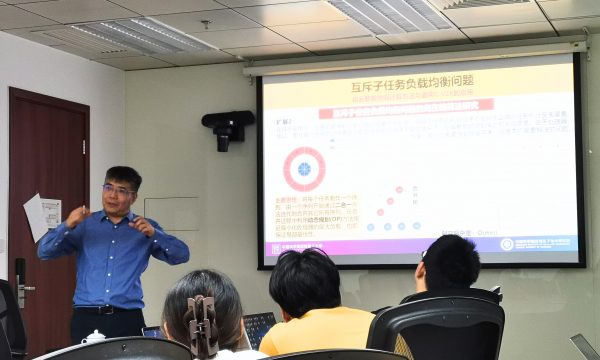
Prof. Yang Wang introduces his load balancing research

Group photo
The seminar on “Edge-cloud Collaborative Computing in a Microservices Architecture”, organized by the Faculty of Science and Technology (FST) and co-organized by the Asia-Pacific Academy of Economics and Management (APAEM) of the University of Macau (UM), was successfully held last Friday (Oct 20th). Prof. Yang Wang, UM Distinguished Visiting Scholar and Researcher of the Shenzhen Institute of Advanced Technology (SIAT) of the Chinese Academy of Sciences (CAS), delivered the seminar, which was moderated by Prof. Jerome Yen, Distinguished Professor of FST.
The seminar focused on the themes of edge-cloud collaborative computing and load balancing, which are crucial technologies for edge intelligence based on microservices. Prof. Wang provided insights into these technical aspects from three perspectives: theory, methodology, and practice. Firstly, he discussed edge-cloud collaborative computing for microservices based on Eulerian cycles, exploring the problem and proving that the length of the shortest path on the Eulerian cycle remains independent of the cycle’s selection. Additionally, Prof. Wang demonstrated the complexity of the load balancing problem for mutually exclusive subtasks and presented both offline and online algorithms to address this issue. These findings have significant implications for optimizing heterogeneous cloud computing environments in the future.
Furthermore, Prof. Wang introduced the collaborative project between UM and SIAT, titled “Edge-Cloud Intelligent Collaborative Computing Methods and C-V2X Oriented Applications”. This project, classified as a Type C project under the Shenzhen-Hong Kong-Macao Science and Technology Research Programme, exemplifies the integration of industry, academia, and research in the Greater Bay Area and contributes to regional innovation. During the Q&A session, the audience displayed a keen interest in Prof. Wang’s novel microservice edge cloud partitioning model, posing questions regarding the relationship between Eulerian circles and edge cloud partitioning as well as the selection of Eulerian circles. Prof. Wang responded to the questions and commended the audience for their thought-provoking inquiries. The seminar concluded successfully, fostering a vibrant academic atmosphere.

